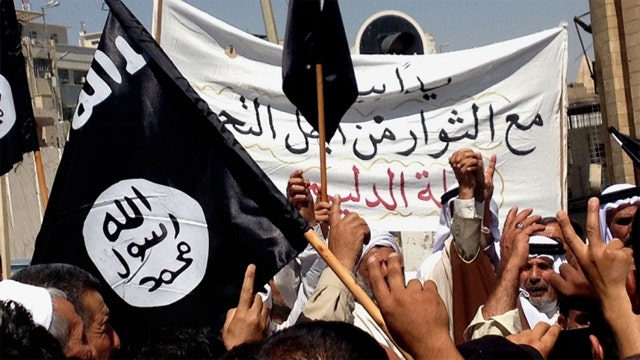President Obama to meet with Congressional leaders on ISIS
NATO allies have agreed to aid US against ISIS
President Obama said Sunday that the United States will “go on the offensive” against Islamic State militants in the Middle East and that he will further outline his plans Wednesday in a speech.
“The next phase is us going on the offensive,” Obama said in an interview that aired Sunday on NBC’s “Meet the Press.”
The president said that on Wednesday he will not announce the use of U.S. ground troops or a campaign equal to the war in Iraq, and that his goal is to make clear the mission is to deal with terror threats like those over the past several years. A senior Obama administration official told Fox News imminent, new military action in either Iraq or Syria was not expected to be announced in the speech.
Obama said he has the “authority he needs” to increase attacks on Islamic State targets without congressional approval, but he did not answer repeated questions about whether he will order air strikes on Islamic State targets in Syria.
A senior White House official told Fox News that Obama's primary aim in the Wednesday speech will be to update the American public on what the strategy is to deal with the militant group, saying the administration wants "people to understand how he's approaching this."
When Congress was on summer break, the president ordered strikes on the group’s military targets in Iraq, saying they were to protect U.S. personnel and requested by the Iraq government as part of a humanitarian effort to preserve infrastructure and save Iraqi minorities.
Obama said Sunday the upcoming effort is part of three-step plan that started with intelligence gathering and will include helping install a new Iraqi government.
“I’m confident we can get this done,” he said.
Obama acknowledged on "Meet the Press" that the Islamic State is unique because of its “territorial ambitions” in the Middle East.
"Over the course of months, we are going to be able to not just blunt the momentum of ISIL," he said, using an alternate name for the group. "We are going to systematically degrade their capabilities. We're going to shrink the territory that they control. And ultimately we're going to defeat them."
Reps. Peter King, D-N.Y., and Adam Smith, D-Wash., each told ABC’s “This Week” that the president should take swift action instead of trying to get congressional approval and getting bogged down in a prolonged debate.
“Getting the exact language through Congress would be extremely difficult,” Smith said, “though I think that’s what we ought to do.”
Obama will outline his plan after meeting Tuesday in the Oval Office with Capitol Hill leaders -- Senate Majority Leader Harry Reid, D-Nevada; Senate Minority Leader Mitch McConnell, R-Ky.; House Speaker John Boehner, R-Ohio; and House Minority Leader Nancy Pelosi, D-Calif.
“What I'm going to ask the American people to understand is that this is a serious threat,” Obama told NBC. “We have the capacity to deal with it, and here's how we'll deal with it. This will require some resources above what's already in there.”
Obama also said that he has not seen any immediate intelligence of threats to the U.S. homeland.
The interview was conducted Saturday at the White House shortly after Obama returned from a NATO summit in Wales, where the Islamic State threat was a key topic of discussion. The speech will come one day before the 13th anniversary of the 9/11 terror attacks.
Obama restated his opposition to sending U.S. ground troops to engage in direct combat with the militants, who have laid claim to large swaths of territory in Iraq, targeted religious and ethnic minority groups, and threatened U.S. personnel and interests in the region.
At Obama's direction, the U.S. military has conducted more than 130 air strikes against Islamic State militants in Iraq in the past month. In retaliation, the group recently beheaded two American journalists it had been holding hostage in Syria, where the organization also operates.
Lawmakers have pressed Obama to expand the air strikes into Syria. He has resisted so far, but said he has asked his military advisers for options for pursuing the group there.
In the interview, Obama said the U.S. would not go after the Islamic State group alone, but would operate as part of an international coalition and continue air strikes to support ground efforts that would be carried out by Iraqi and Kurdish troops.
At the NATO summit, the U.S. and nine allies agreed to take on the militants because of the threat they pose to member countries.
Obama's emerging strategy depends on cooperation and contributions from regional partners, including Saudi Arabia, Jordan and Turkey, in addition to the formation of a new government in Iraq.
Obama said he expected the Iraqi government to be formed this week.
Last month, while vacationing on the Massachusetts island of Martha's Vineyard, Obama was criticized for heading to the golf course minutes after he appeared in public to angrily denounce the Islamic State militants for the videotaped killing of American journalist James Foley.
Asked whether he wanted a do-over by new "Meet the Press" host Chuck Todd, Obama said that, while there will always be tough news somewhere, he "should've anticipated the optics" of immediately going to play golf after delivering that statement in which he said he had just gotten off the phone with Foley's parents.
But Obama said the more important question is whether he is getting the policies right and whether he is protecting the American people and, on that score, he said, "I think I've done a very good job during the course of these last, close to six years."
Fox News' Ed Henry and The Associated Press contributed to this report.






















